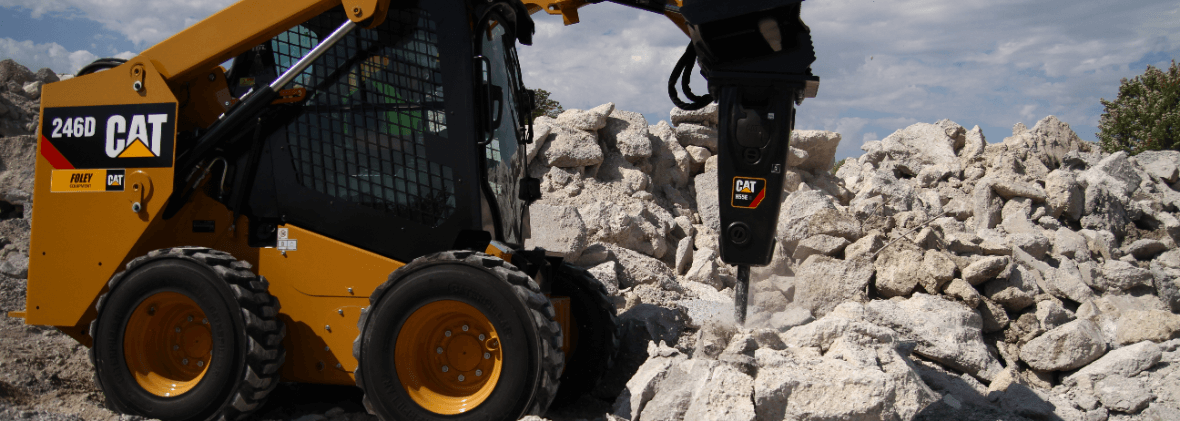
How to Dispose of Concrete
Whether you're performing a large-scale demolition, a commercial construction job or a remodeling project at home, disposing of leftover materials from a project can sometimes be the most challenging part of the entire process. Materials like concrete require special attention, as the large chunks can pile up quickly around your work site. While some companies end up hauling these large piles of excess concrete to the local landfill, there are much more environmentally friendly alternatives.
Benefits of Recycling Concrete
Although recycling concrete 100% of the time may not be practical, doing so when possible can have a substantial positive impact on the environment — and a project's budget. Because concrete chunks and slabs take up significant space, transporting them to a landfill can be incredibly costly. Fortunately, there are many ways to recycle used concrete depending on the type, amount, size and shape of the pieces.
Some of the primary benefits of recycling concrete over depositing it directly into a landfill include:
- Reduced disposal costs: Recycling or repurposing your used concrete saves significant money on hauling and landfill depositing fees.
- Improved efficiencies: Utilizing options to recycle concrete on-site improves operational efficiency by eliminating large piles and allowing your equipment to maneuver freely.
- Lower material costs: When you repurpose old concrete into backfill, aggregate base, landscaping mulch or some other usable form, you reduce your company's overall raw material expenses.
Methods of Concrete Disposal
Depending on the project type, some methods for concrete disposal are more effective than others. If a homeowner is replacing a sidewalk section and has a few slabs of leftover concrete, renting equipment to crush the excess material doesn't make much sense. At the same time, if a construction company is performing a demolition project with several tons of broken-up concrete, it doesn't pay to use a dumpster and have it hauled away each time it fills up.
Several of the most common concrete disposal methods include:
- Landfills: Although landfills are the least environmentally friendly option, they are sometimes necessary for smaller jobs or when eco-friendly recycling is unavailable.
- Dumpsters: Many waste management services offer dumpsters for used materials for a flat fee that includes the transport and disposal costs. These services often utilize the most practical forms of recycling rather than emptying the containers into landfills. Dumpsters work as cost-effective options for smaller jobs without excessive waste.
- Building material suppliers: Depending on the size, shape and amount of concrete waste you generate, building supplies retailers will accept used concrete and recycle it appropriately, although you will likely need to transport it to their facility.
- Landscape companies: Landscaping companies frequently seek used concrete and other materials for base layers and backfill when building sidewalks, digging foundations or constructing retaining walls. Depending on the amount or size of the pieces, they may even remove your waste for free.
- Junk haulers: Although junk hauling companies charge fees for removing concrete waste, they are sometimes a much better option than renting large commercial trucks to transport it and recycle it off-site.
- On-site recycling: If your operation is large enough and warrants the cost of equipment rental, choosing The Cat® Rental Store for recycling equipment like cold planers and crushers can generate significant savings for your company. These tools grind up the concrete as you tear it away, creating smaller aggregate materials that are reusable later. Models come in many designs, from highly maneuverable compact machines to large-scale cold planers ideal for road and highway applications.
Types of Reusable Concrete
Before choosing a disposal method, it's critical to understand the different types of concrete waste and how you can repurpose or recycle them. Some of the most common reusable types include:
- Concrete blocks and slabs: Blocks and slabs represent the largest sizes of concrete waste and are often too large for dumpsters or bins. These types typically require jaws or large impactors to break them down into smaller pieces before recycling.
- Concrete chunks and rubble: Chunks can include anything from blocks to pavers to broken-down slabs. Depending on the recycler, they can work as backfill options or be broken down further for smaller aggregate applications.
- Concrete mix and slurry: Slurry or mix is ideal for pouring foundations for a structure or a driveway or inserting a pole or a post into the ground. Since dry mix is already broken down, it has many practical uses, like representing the primary ingredient for engineered sand. Slurry is easily condensable by removing the water with a solidifier.
Contact the Professionals at The Cat® Rental Store Today
If you're looking for the optimal concrete recycling solutions for your organization, The Cat Rental Store has multiple options to fit your needs. Our expansive dealer network provides access to experts who can analyze your application and help identify the most beneficial equipment solution. Contact us online for a quick quote or call 1-800-RENT-CAT today to learn more.
Find The Cat Rental Store Near You